Let’s get one thing out-of-the-way first. Quantum Leap, which ran on NBC from 1989-1993, is easy to mock. It wore its heart so prominently on its sleeve, it was practically part of the fabric. It told the story of Sam Beckett (Scott Bakula), just your average medical doctor/ quantum physicist who also sang, danced, karate kicked, and multi-linguist-ed, who one day decided it was possible to time travel within his own lifetime. He tested the experiment on himself (since that always turns out well), and then found himself trapped in time. He “leaped” into individuals whose lives needed changing (everyone around him saw the person into whom he had leapt), “put right what once went wrong” and leapt out again. He always wanted to leap home, but instead perpetually ended up in someone else’s life, with someone else’s reflection looking back at him. In order to help him know what he’d been sent there to do (Sam theorized God or Fate or Time had taken over the experiment and was using him as a kind of repair angel), he had a guide from his own time, Al (Dean Stockwell), who appeared to him as a hologram. Al, along with an egotistical computer named Ziggy, provided Sam with the information needed to repair whatever situation needed repairing.
The thing about Quantum Leap is that it isn’t really a sci-fi show. True, it has time travel, holograms, and laughably absurd futuristic fashions, but it’s about human interactions, and outside of the show’s basic premise, most of the episodes had very little sci-fi content. I watched Quantum Leap when the Sci-Fi channel (before it was Sy-Fy, an abbreviation that makes no sense). It came on after school, and I would tape it, so that I had access to Quantum Leap whenever I wanted it. I couldn’t bear the idea of only being able to watch it when it aired. When each season came out in DVD, I bought them. However, looking through the synopses listed, I have come to realize that practically every episode of Quantum Leap is a “very special episode.” This week, Sam leaps into an African-American man in segregation era South and learns how terrible racism is. Next week, Sam leaps into a woman (It’s funny. At first, I mis-typed “into” as “onto” which totally changed the dynamic of this sentence.) and learns that sexism is wrong. The show walks a very fine line between endearing old-fashioned drama and eye-roll inducing saccharine schmaltz.
One thing that keeps the show on the right side of that line (most of the time) has to do with the cast. Scott Bakula, fresh off a Tony nomination when he was cast, ensures Sam remains interesting, despite having no real flaws. The show never loses sight of the tragedy of Sam’s life. He’s separated from contact from his family and friends, and frequently complains about no longer getting to live his own life, making him a character that seems pitiably noble. The tragedy at the premise’s center keeps the audience’s affection for Sam firmly in place. Meanwhile, Dean Stockwell (who had been acting since childhood and has an Oscar nomination to his name for Married to the Mob), played Al as a womanizing scoundrel whose bad behavior concealed a wounded, damaged soul. Sam and Al were polar opposites as characters, at least in terms of timidity and life experience, but both were also inherently good and decent. Their characters reemphasized the essential optimism and goodness at the heart of the series. The fact that the show isn’t annoying beyond all measure speaks to endearingly old-fashioned storytelling that encompassed pretty much every episode, and the relatable watch-ability the two leads brought to its characters.
I’m not saying Quantum Leap is for everyone. Some episodes are embarrassingly sappy and some feel downright terrible in comparison with more modern programming. However, if you ever want to watch someone repair the past week after week (after week ad infinitum), these 10 episodes are good places to start:
*This Is a Spoiler-Light List for the Benefit of Those Who May Be New to the Show*
10) Good Night, Dear Heart (Season 2, Episode 17)
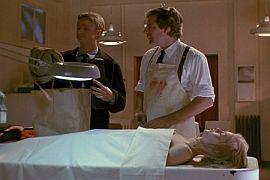
Quantum Leap, for all of its surprisingly conservative viewpoints, was actually rather socially progressive. Gay rights, race relations, animal rights, and an examination of the “blame the victim” mentality that can accompany a rape case were all tackled during the series five season run, and it usually came down on the socially progressive side. This episode, whose title comes from a poem on Mark Twain’s daughter’s headstone, features Sam leaping into a coroner/ mortician and discovering a young, supposed suicide victim on his exam table. Sam finds himself driven to understand why the young girl committed suicide and concludes that she was, in fact, murdered. The episode features an abortion, a same-sex relationship, and a pretty well-crafted murder mystery. At the heart though, is Sam, the decent central figure who finds himself constantly surrounded by corruption and cruelty, yet remains as noble and steadfast as ever.
9) Future Boy (Season 3, Episode 13)

Here, Sam leaps into a young actor playing “Future Boy” on a local-access tv show called Captain Galaxy. His mission? Repair Captain Galaxy’s (or Moe Stein, the absent-minded professor at the center of Sam’s mission) relationship with his estranged daughter in order to prevent her from having him committed. It’s a charming, sweet-natured story that keeps its sentiment front and center, but never descends into mawkishness. The real reason I include it here, though, has to do the ironic twist at the episode’s end. If you know it, you know what I’m talking about. If you don’t, you deserve to hear it in the episode, unspoiled by me.
8) Double Identity (Season 1, Episode 6)

Quantum Leap’s brief first season appears more like an early cooking attempt of an eventually competent chef. The ingredients are there, and you know he’s on the right track, but he’s gotta practice in order to really hone his craft. This episode, however, has some delightful comedy (probably some of the series’ best) with its Godfather homages and some Sam Beckett song belting. He leaps into a mafia hit man, sleeping with the Godfather’s mistress, and that’s just the beginnings of his problems. As a first season episode, it features a B-plot in which Al and the unseen Quantum Leap team back home have a plan to get Sam back to their time (they dropped that in later seasons). The plan calls for Sam to recreate the circumstances surrounding him when he first leapt in. Bakula has a well-refined sense of comedic timing that was rarely showcased as prominently as it was here (he was usually relegated to Dean Stockwell’s straight man), and this episode was the earliest indication as to the versatility of their leading man.
7) Ghost Ship (Season 4, Episode 16)
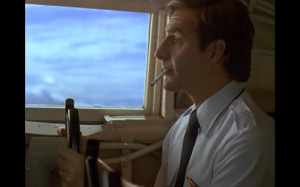
Despite the show’s explicitly sci-fi backdrop and metaphysical implications, Quantum Leap didn’t go to a supernatural area very often. There are a handful of episodes, but they are few and far between. Here, though, Sam leaps into a pilot who must save the life of a woman whose appendix has ruptured. The problem? Their flying over the Bermuda Triangle (or, if you prefer the spookier pronunciation, the Berrrrmuda Triaaaaangle), and their equipment continues to malfunction. It’s a clever, well-written episode of the series, with one of their cleverestsupernatural nods.
6) Honeymoon Express (Season 2, Episode 1)
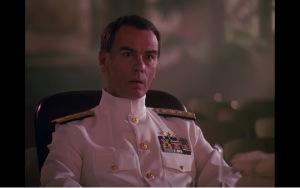
One of the recurring plot devices of Quantum Leap’s first season revolved around continuing to secure project funding. Eventually, the series decided this was an unnecessary distraction to the whole “putting things right that once went wrong” thing, and they dropped it. Here, though it’s front and center, as Sam leaps into a man on his honeymoon who must prevent himself from being harmed by his new bride’s ex-wife. Al, however, desperate to prove to a committee of glowering politicians that Project: Quantum Leap is worthy of government funding (good luck trying that with our politicians today) attempts to convince them by trying to alter an event of historic importance. It also has a lot of fun with the chase, boy scout Sam on a honeymoon with a woman who definitely wants to consummate her recent nuptials and yet another clever, playfully sly ending. What really makes this episode stand out for me most, though, is the relationship between Sam and Al and the way it’s presented here. They are one of many opposites-attract partnerships littering both film and television screens, but this episode marks one of the earliest indications that the two of them were legitimately good friends. There’s an emotional bond between the two and it becomes evident when Sam is confronted with the knowledge that project funding could be pulled and his interactions could come to an abrupt end. It’s a lovely moment that foreshadows how critical their relationship would be to the show’s cult following.
5) A Single Drop of Rain (Season 4, Episode 16)
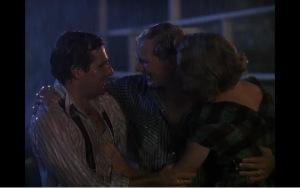
There may be better episodes of Quantum Leap, but there are none as effortlessly delightful as this one. Sam leaps into a traveling con man, an old-fashioned snake-oil salesman who claims he can make it rain. Well, what luck, he’s traveled to his home town, and they desperately need rain after a long drought. Sam’s there to keep his brother’s wife from running off with him, but Sam wants to make it rain too, something over which he really has no control. The show rarely presented Sam with an issue he couldn’t solve through the sheer force of his own innate goodness, and it’s interesting watching him struggle with a problem for which he has no real solution. It ends, of course, in the most sentimental fashion possible, but it’s such a charming episode, why would I ever bother to complain?
4) Leap Home: Pt. 1 & 2 (Season 3, Episodes 1 & 2)

Between Sam and Al, Project: Quantum Leap was a psychiatrist’s wet dream. Al had been abandoned by his mother, raised in an orphanage with his mentally challenged sister (who died in an institution) and was a Vietnam POW who had been abandoned by his wife. Sam, meanwhile, was a shy, emotionally reserved genius, whose father died of a heart attack, whose brother had been killed in Vietnam (that war was tough on QL employees), and whose sister had eloped with an alcoholic who physically abused her. These two characters had more trauma than most psych wards’ patients combined. Here, though, Sam gets a brief respite, leaping into himself as a teenager. All he has to do is win the “big game,” but Sam decides he’d also like to save his father, brother, and sister. Al tries to caution him, but Sam remains determined until his plan collapses around him. Part II gives him a chance to right one of those wrongs, but it comes at a steep price. Quantum Leap usually ended on an optimistic, life-affirming note, but these two episodes are achingly poignant and bittersweet. They’re lovely and sentimental, but there’s an underlying melancholy that permeates them. Bakula gives an especially fine performance here, reminding the audience how much he’s given up for the QL project and how little he’s been able to do to improve his own life.
3) Mirror Image (Season 5, Episode 21)
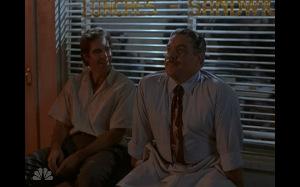
Ah, the series finale. I know this episode wasn’t meant to be a series finale. It was supposed to be a transitional episode, signaling an end to the way Quantum Leap had been working and how it would function in future seasons. However, this episode, even without its tacked on coda, feels like a series finale. I’ll admit, when I first watched it, I hated it. It seemed to betray the series’ entire premise. However, now I think it’s a lovely, poignant sent off.
Sam leaps into a mining town to find himself, exactly as he appears, staring back at him in the mirror. What follows are a series of vague revelations about the nature of “leapers” and who may be controlling Sam’s leaps into the past. It ends with Sam finally setting right an event from Al’s past. It may end with the most soul crushing text ever to grace a television’s screen, but it celebrates everything that made Quantum Leap a journey worth taking.
2) Catch a Falling Star (Season 2, Episode 10)
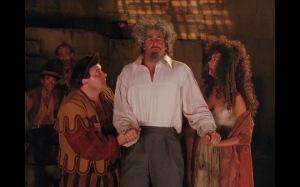
Sam Beckett could have been a bland character. He’s pure and good to an almost Messianic extent, with a sense of morally superior lecturing that seemed hopelessly naive, and characters like that are difficult not to find grating. Credit really goes to Bakula for making the character work as well as he does. He made sure that the tragedy at the heart of Sam’s blindly optimistic journey was always a character undercurrent. Here, though, that tragedy is front and center as he plays an actor cast in an Off-Broadway production of Man of La Mancha and finds himself reunited with a former teenage crush. They begin a relationship, but of course Sam knows that a relationship with a built-in ticking clock. Eventually, he’ll leap out, someone else will leap in, either building upon the relationship Sam has established or letting it crumble and disintegrate, and Sam will have to start back over from scratch. Having Sam play a character like Don Quixote, with his absurd, “impossible dreams” and blindly optimistic quests may seem a bit in the nose, and the episode’s need to flat-out state the thematic connection is a bit unnecessary, but the end, when Sam, as Cervantes/ Don Quixote exits the stage to a chorus of “The Impossible Dream,” it’s near-impossible to feel a bit misty-eyed.
1) MIA (Season 2, Episode 22)
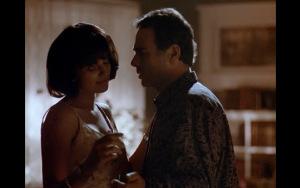
Just before Sam leapt into himself as a teenager in “The Leap Home,” Al was confronted with the chance to change his life for the better, ignoring any possibility that Sam may have arrived on the scene for any other reason. Sam leaps into a vice cop, with a traumatized partner, but Al keeps telling Sam he’s there to stop a woman from leaving her MIA husband.
This isn’t the first time Quantum Leap presented our two leads with the temptation to change their own, personal histories. Sam faced that temptation in the second ever episode (“Star-Crossed”) and dove in head-first, but it lacked any real emotional punch, because viewers hadn’t had time to form an attachment to its two main characters. However, by the time this episode rolled around, viewer’s protective affection for Sam and Al was front and center. We knew how dreadful their backgrounds, and we wanted them to have a few, sporadic touches of happiness. This episode makes both Sam’s and Al’s opposing viewpoints seem alarmingly selfish and sympathetic. Al is ignoring the very thought that Sam may be there to save someone else (as in fact, he is), because all he can think of is the fact he can finally have back the wife he loved so much. He’s blinded by emotions, and it would be easy for him to come off as unsympathetic, but Stockwell ensures Al stays on the right side of emotional desperation. Meanwhile, Sam, who will face this same challenge in the next episode and be just as emotionally blinded, tries to take the rational, scientifically minded, view that they cannot change their own fates– a view that could come off as horribly unyielding, but instead comes off as tragically rule-bound, because Bakula makes Sam’s dilemma and sympathy for Al’s plight so convincing. Really though, this episode all comes down to its final scene, in which Beth slowly dances to “Georgia on my Mind” as an unseen (by her) Al dances with her. It’s a perfect, beautiful, devastating moment whose impact has not been dulled by time.
Quantum Leap is available to stream through Netflix and Hulu (with its original, still copyrighted music, no less) and available to purchase on DVD.
And, now, the moment you’ve all been waiting for: The horribly catchy opening credits of Quantum Leap:
http://www.youtube.com/watch?v=DjK9GJMBpt0
So, what do you think, guys? Are there episodes I left out? Any here you think shouldn’t have been (I don’t care what you say, I’m not putting that chimp episode in my Top Ten. Sorry.) ? Let us know in the comments!

